|
 |
|
Background
The village of Moxley grew-up alongside
Telford’s Holyhead Road, across the boundaries of Darlaston,
Wednesbury, and Bilston. It sits on the South Staffordshire
coalfield and has abundant deposits of sand and clay.
Large scale industrial development was
made possible by the building of the Walsall Branch of the
Birmingham Canal, which opened in 1809. It allowed heavy and
bulky items to be easily and economically transported around
the area.
Moxley had many coalmines, ranging from
small bell pits and gin pits to the large Moorcroft
Colliery. Clay was first excavated on a large scale by the
Wood family who were local landowners. They opened Moxley
Brickworks, which was next to the canal. The sand deposits
were much prized by foundries, and large quantities were
removed. It was an ideal casting sand because of its
fine-grain structure.
The local coal deposits, the casting
sand, and the canal, made it possible to build large
ironworks in the vicinity. By the middle of the 19th
century, Bull’s Bridge Iron Works, Albert Works, Moxley Iron
Works, and Victoria Iron Works had grown to dominate the
area.
Moxley’s most important 19th century
industrialist, ironmaster, and owner of coalmines, sand
pits, and a brickworks was David Rose. What follows is the
story of his family.
|

The location of the Rose family's iron works
and home.
|
The Early Years
The Rose family hails from the
Northfield area of Birmingham, and for several generations
moved between Northfield, Halesowen, and Rowley Regis. On
16th October, 1797 David Rose’s parents, William Rose and
Elizabeth Tingle were married at Rowley Regis. By the early
years of the 19th century they had moved to Bradley in
Bilston, along with many others, who had come to the Black
Country in the hope of improving their standard of living.
Bradley was rapidly becoming an industrial area thanks to
the Birmingham Canal, John Wilkinson’s Ironworks, and the
many mines producing coal and iron ore.
In 1851, William Rose, by then 70 years
old, and a master hinge maker, was working as a grocer in
the family’s shop, possibly opened by his wife. They had ten
children:
|
|
Year of birth |
|
|
Year of birth |
|
Daniel
|
1799 |
|
David |
1810 |
|
James |
1800 |
|
Hannah |
1814 |
|
Henry |
1802 |
|
John |
1816 |
|
William |
1805 |
|
Joseph |
1818 |
|
Elizabeth |
1808 |
|
Maria |
1820 |
|
|
|
|
|
|
|
As far as is known, James
died at an early age.
|
|
Marriage Details |
|
|
Occupation |
Wife |
When and Where married |
|
Daniel Rose |
Ironmaster |
Mary Penrose |
1823 in Sedgley |
|
William Rose |
Ironmaster |
Elizabeth Fellows |
1828 in Wolverhampton |
|
Henry Rose |
Works Manager |
Mary Mason |
5th Sept. 1830, Penn, W’ton. |
|
David Rose |
Ironmaster |
Zebiah Fullwood |
1834 in Wolverhampton |
|
Joseph Rose |
boat builder &
publican |
Teresa Collins |
1837 at Penn, Wolverhampton |
|
John Rose |
Wheelwright |
Rachael Hill |
1838 in Dudley |
|
|
|
|
|
|
|
|
|
|
|
|
Husband |
Occupation |
When and Where married |
|
Elizabeth Rose |
Daniel Offley |
Ironmaster |
15th October, 1831 |
|
Hannah Rose |
Noah Smith |
Sawyer |
1835 in Wolverhampton |
|
Maria Rose |
George Fellows |
Stone mason |
1841 in Wolverhampton |
Business Ventures
William Rose was part owner of Rose
Higgins and Rose, in Bradley Fields, Bilston. The other
owners were Isaac Higgins and Thomas Rose, possibly
William’s cousin. In 1853, William pulled out, and the
business continued as Higgins and Rose, until 1857 when it
closed.
|
|
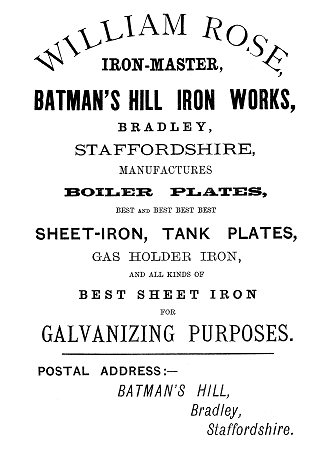
An advert from 1873. |
Daniel Rose rented a piece of land in
Bradley in 1833 and 1850, then purchased it in 1854, with
the help of ironmaster, David Hickman and architect William
Derby Griffin. On the land they founded Batman's Hill Iron
Works which was run by Daniel’s brother, William. They had
eleven puddling furnaces, and three mills and forges.
Products included boiler plates, sheet iron, tank plates,
gas holder iron, and best sheet iron for galvanising. The
business was very successful until the depression in the
iron trade in the late 1870s. It went into liquidation in
1879.
It is commemorated in Bradley by Rose Street, named
after the family. Daniel retired in the 1840s and moved to
Aston, Birmingham with his wife Mary and daughter Martha. He
died in 1868 at the age of 69.
Elizabeth Rose’s husband Daniel Offley
was a member of an old Darlaston family. He ran the
Moorcroft Ironworks, and was later involved in the family’s
ironworks at Moxley.
|
|
In 1827 David and Daniel founded the
Albert Ironworks in Bull Lane, Moxley, and in 1830 founded
the Moxley Ironworks off the Holyhead Road. Around 1840
Moxley Ironworks was sold to the Wells brothers, and David
and Daniel purchased the Victoria Ironworks, which was next
to the Albert Ironworks in Bull Lane. Their brother Henry
became Works Manager.
All kinds of iron forgings, and types
of charcoal sheet iron were produced in the factory. There
was a large galvanising plant, corrugating machines, and a
rolling mill. Products included boiler plates, gasometer
sheets, corrugated sheets, iron bars, iron rounds, fancy
iron, pig iron, pan plates, and tank plates. In the 1840s
there were two blast furnaces that could produce 20,000 tons
of pig iron annually, and by the1870s there were 40 puddling
and ball furnaces, 5 sheet mills, 1 plate mill, 1 bar mill,
and a hoop mill.
David Rose also owned a number of coal
mines in Moxley, and a sand pit where sand was dug and sold
for use in blast furnace and mill furnace bottoms. The site
also included a clay pit, and a brick works, which made high
quality fire bricks. David also had a factory at The Green,
Darlaston in 1835. |
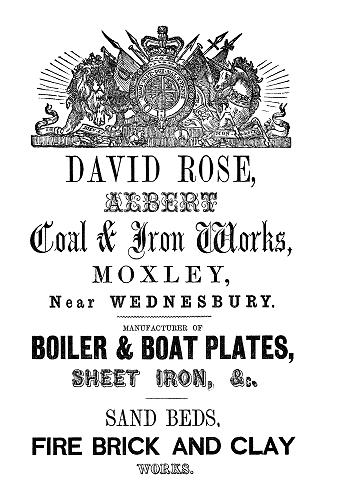
An advert from 1861. |
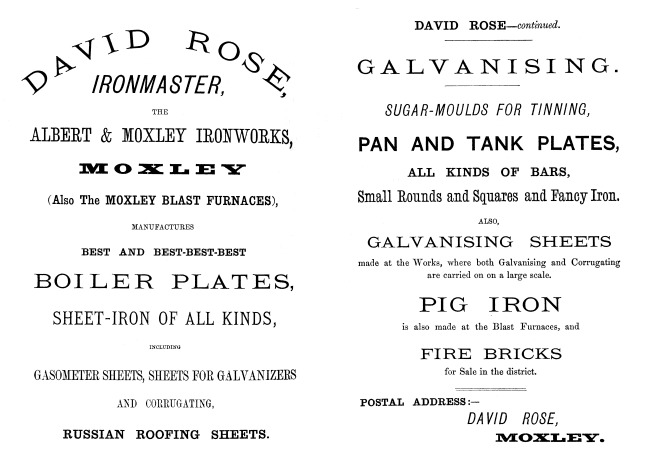
An advert from 1873.
|
David Rose and His Family
David’s wife Zebiah was the daughter of
an ironmaster, their first son Henry Fullwood Rose was born
in 1837 at Darlaston. In 1839 while the couple were at the
industrial town of Couillet in Belgium, probably on
business, Zebiah gave birth to their second son William
Napoleon Rose, who would eventually work with his father in
the family business.
By 1851 they had moved to a large
Victorian house called The Heath. It stood where Heath Acres
is today, and overlooked their Moxley works. The family
remained there until the late 1860s when the house was taken
over by William Napoleon and his wife Lydia, who were
married in 1868. In 1864 David purchased two acres of land
alongside Goldthorn Hill, Wolverhampton and had a large
house built there, which he called Goldthorn Court. Although
the house has now gone (it was demolished in the 1930s), the
lodge still exists on the corner of Goldthorn Road.
David and Zebiah’s children were as
follows:
| Henry Fullwood Rose, born in 1837 at
Darlaston |
| William Napoleon Rose, born in 1839 at Couillet, Belgium
|
| Elizabeth Rose, born in 1847 |
| David Rose, junior, born in 1848 |
| George Daniel Fullwood Rose, born in
1850 |
| Arthur Thomas Frederick Rose, born in
1854 |
David’s businesses thrived in the 1860s
and 1870s. He acquired land in Darlaston, and Bilston, and
had coal mines at Old Hill.
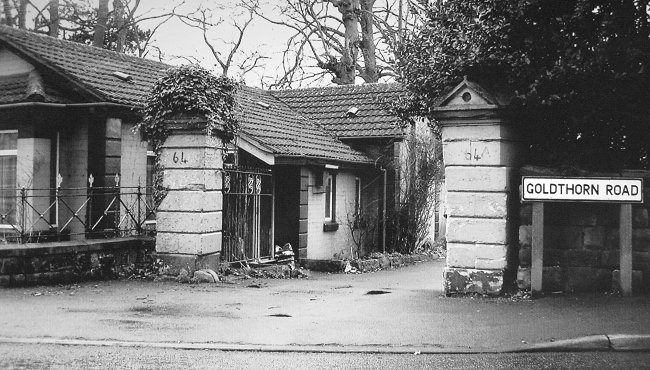
The old lodge to Goldthorn Court, on
the corner of Goldthorn Road. Courtesy of Mary Harding.
|
|
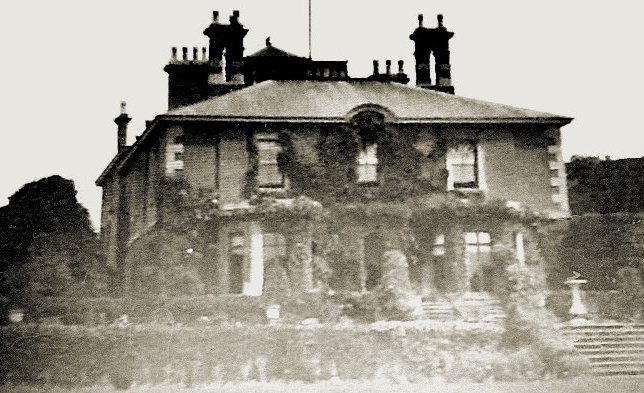
Goldthorn Court, in about 1920. Courtesy of
Mary Harding. |
|
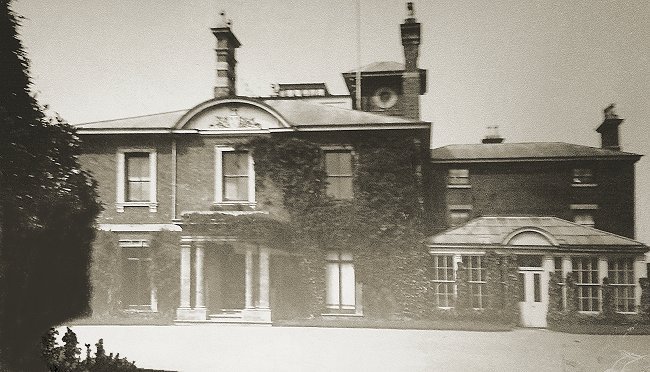
Another view of Goldthorn Court,
in about 1920. Courtesy of
Mary Harding. |
| |
|
| Proceed to Part Two |
 |
| |
|
 |
|
 |
|
Return to A Brief History of Darlaston |
|
Return to the Wednesbury Menu |
|